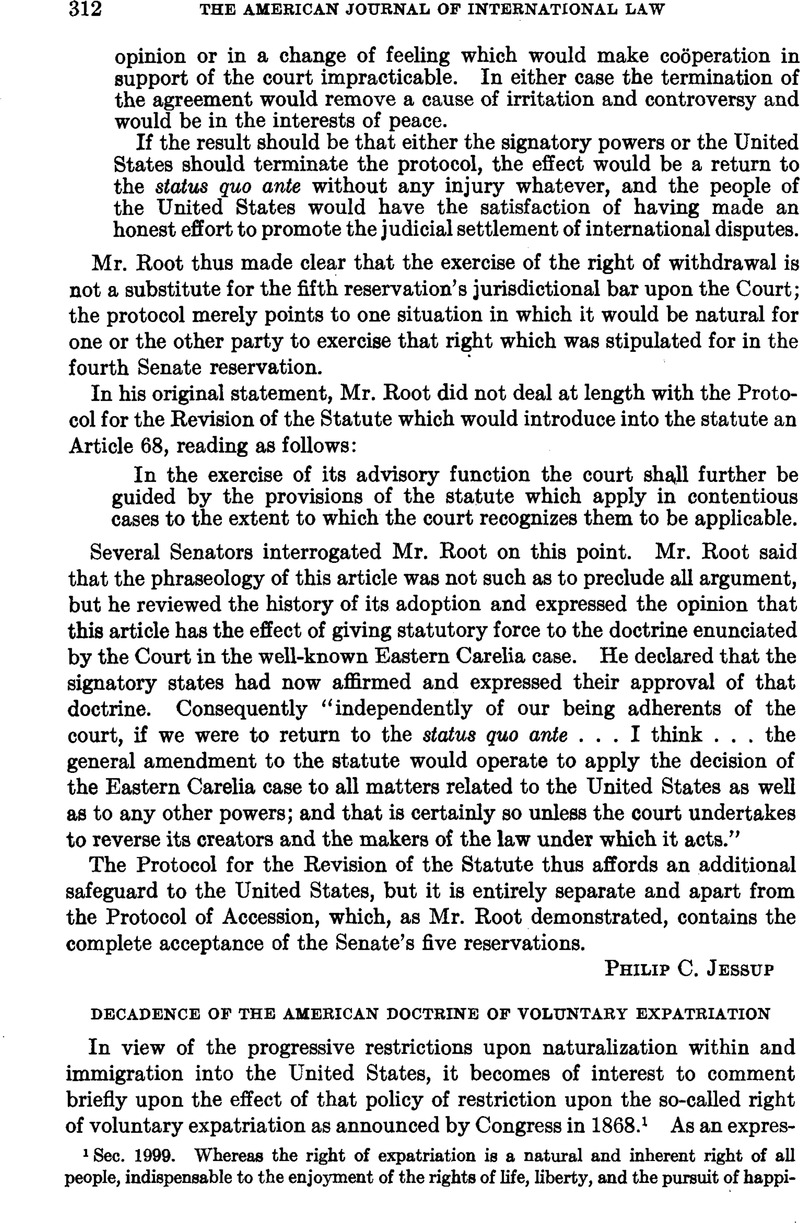Article contents
Decadence of the American Doctrine of Voluntary Expatriation
Published online by Cambridge University Press: 12 April 2017
Abstract

- Type
- Editorial Comment
- Information
- Copyright
- Copyright © American Society of International Law 1931
References
1 Sec. 1999. Whereas the right of expatriation is a natural and inherent right of all people, indispensable to the enjoyment of the rights of life, liberty, and the pursuit of happinaturalizaness; and whereas in the recognition of this principle this Government has freely received emigrants from all nations, and invested them with the rights of citizenship; and whereas it is claimed that such American citizens, with their descendants, are subjects of foreign states, owing allegianceto the governments thereof; and whereas it is necessary to the maintenance of public peace that this claim of foreign allegiance should be promptly and finally disavowed: Therefore any declaration, instruction, opinion, order, or decision of any officer of the United States which denies, restricts, impairs, or questions the right of expatriation, isdeclared inconsistent with the fundamental principles of the Republic.
Sec. 2000. All naturalized citizens of the United States, while in foreign countries, are entitled to and shall receive from this Government the same protection of persons and property which is accorded to native-born citizens. (Joint Resolution of July 27, 1868, Rev. Stat. Title XXV, p. 350.)
2 The best history of the American policy of expatriation is to be found in John Bassett Moore's Principles of American Diplomacy, New York, 1918, c. 7. See also C. H. Maxson, Citizenship, New York, 1930, c. 10.
3 3 Dali. 133, 164 (1795).
4 Judge Moore says: “ The idea of expatriation comprehends not merely the loss, but the change, of home and allegiance; it includes not only emigration but naturalization,” citing Black, Attorney General, in 9 Op. Atty. Gen. 356 (1859). Moore, Digest of International Law, III, 552.
5 3 Dali. 133, 152-3, 164-5 (1795).
6 Moore, , Principles of American Diplomacy, supra, p. 271.Google Scholar
7 8 Op. Atty. Gen. 139 (1856).
8 9 Op. Atty. Gen. 356 (1859).
9 Moore, Principles, supra, 288.
10 These are referred to in the analytical index to Flournoy and Hudson, Nationality Laws, 1930, pp. 733-735.
11 The multilateral treaty is receiving ratifications. See Treaty Information Bulletin No. 16, Jan. 1931, p. 3. Bilateral treaties to this effect have recently been ratified by the United States with Norway and signed withAlbania. Press Release 70, Jan. 31,1931, p. 56; Press Release 72, Feb. 14, 1931, p. 77.
12 See his article in the Metropolitan magazine for June, 1915, entitled “When is an American not an American?” , and the reply of Richard W. Flournoy, Jr., of the Department of State, which appeared in the New York Times magazine, Sept. 12, 1915, p. 17.
13 Resolved by the Senate and House of Representatives of the United States of America in Congress assembled, That the President be, and he is hereby, respectfully requested to endeavor as soon as possible to negotiate treaties with the remaining nations with which we have no such agreement, providing that persons bom in the United States of foreign parentage, and naturalized American citizens, shall not be held liable for military service or any other act of allegiance during a stay in the territory subject to the jurisdiction of any such nation while citizens of the United States of America under the laws thereof. · (Joint Resolution of May 28,1928,45 Stat. L. 789.)
- 2
- Cited by




